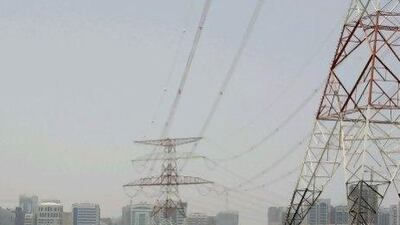Abu Dhabi is cementing its position as the nation's largest power supplier, with exports of electricity to the Northern Emirates expected to surpass that region's production within two years, says a top official.
What's the alternative?:
Energy Join The National as it explores alternative to fossil fuels. Learn more
The emirate pledged this year to increase the supply of energy to the north of the country.
In March, the UAE federal Government announced it would commit US$1.6 billion (Dh5.87bn) to expand infrastructure in the north, with the bulk of spending going on improving electricity transmission and distribution lines.
Such commitments put Abu Dhabi's electricity generating sector under added pressure.
The combination of increasing supply to the Northern Emirates and strong demand growth in Abu Dhabi will next year push the load on the emirate's power plants during the hottest months above 10 gigawatts for the first time.
"Peak electricity demand [on Abu Dhabi Water & Electricity Company] will exceed 10,000 megawatts for the first time," Keith Miller, the director of the planning and studies directorate at the utility, told delegates at a Meed conference in the capital yesterday.
"There are only two other countries in the GCC that have electricity production above 10,000 megawatts, that is Saudi Arabia and Kuwait.".
Peak demand reached 9,800 megawatts this year, Mr Miller said. With an installed generating capacity above 13,000 megawatts, provided by eight power plants, Abu Dhabi can afford to be generous to its neighbours. The amount of electricity exported during peak consumption rose by 19 per cent to 2,100 megawatts versus the 12 per cent growth in peak consumption within the emirate.
Mr Miller forecasts that by 2013, power transmission to the Northern Emirates will reach 3,800 megawatts, more than the combined generating capacity of the Federal Electricity and Water Authority and the Sharjah Electricity and Water Authority, both of which focus on the country's north.
In addition to supplying power to other emirates within the UAE, Adwec has for the first time exported electricity. Bahrain received 50 megawatts of power in August from the company and 100 megawatts in September.
The power transfer is a sign that the UAE is starting to engage in a nascent energy market in the Gulf, made possible by the GCC interconnection grid, a transmission network that has connected the UAE to other GCC states since April.
The amount of power available to Abu Dhabi has recently been boosted by the commissioning of new power plants in Shuweihat and Fujairah. But the rapid rise in demand does not allow for a standstill in expansion, and Adwec is expected to finalise plans for the next power project before the end of the year.
"What makes Abu Dhabi particularly interesting is that electricity demand growth is amongst the fastest growing in the world today, even faster than China in percentage terms," Mr Miller said.
While averaging an annual 8 per cent over the past 21 years, demand growth was 11 per cent in the past three years.
Future demand is expected to be driven by the oil and gas industry. Adwec started supplying the Abu Dhabi National Oil Company (Adnoc) and its subsidiaries in 2007. Adnoc's usage doubles this year to 500 megawatts, but a glut of new power projects will increase demand by the oil company to 2,000 megawatts by 2015.
twitter: Follow and share our breaking business news. Follow us

